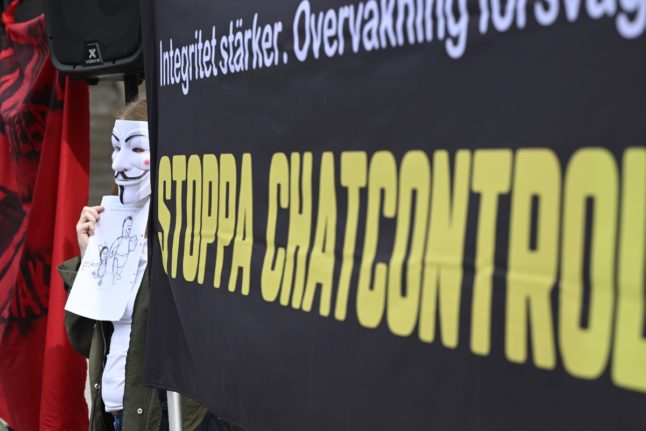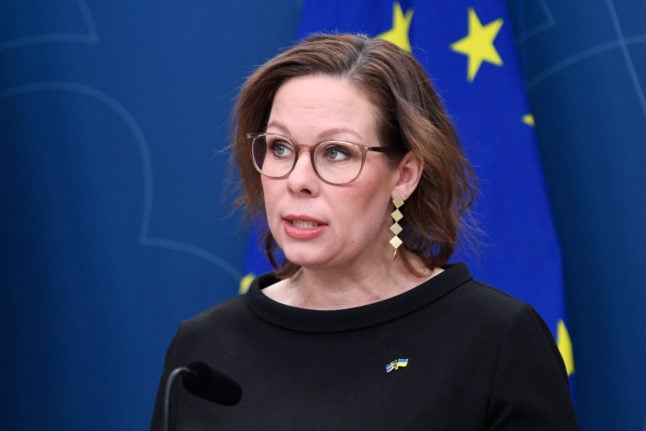What happened last week?
After more than nine months of silence on Chat Control, the informal name given to the EU’s proposed “Regulation to prevent and combat child sexual abuse”, the government last Tuesday rushed a compromise proposal drawn up by the Belgian presidency through the Swedish parliament’s Justice Committee.
The representatives for the Green Party and the Left Party – both of whom are opposed to the measure – then somewhat mysteriously backed the government’s position without leaving a dissenting opinion.
With only the Centre Party and the far-right Sweden Democrats opposing, Sweden’s government could then claim parliamentary backing for supporting the Belgian compromise at a planned meeting of the EU Council on Thursday.
“Now our judgement is that an important step has been taken,” Justice Minister Gunnar Strömmer told TT in a written statement on Tuesday. “The government is therefore ready to take the next step and allow the EU Council and the Parliament to begin negotiations.”
Sweden Democrat MP Adam Marttinen pointed out that both the Moderate and Liberal parties had criticised the proposal during the EU election campaign, saying that they would not push forward with the proposal, only to do so days after the election was over.
“I think that was dishonest with voters,” he told TT.
The Chat Control proposal was, however, not discussed as expected at the EU meeting meeting on Thursday, raising questions over whether it can be handled by the EU Council during the Belgian presidency.
What is Chat Control?
The proposal was put forward by Ylva Johansson, the European Commissioner for Home Affairs, in 2022. It aims to combat child pornography by forcing all encrypted messaging services operating in the EU to build in an “upload moderation” system or “backdoor” into their programmes.
This will allow all images and videos to be scanned for child sex abuse material before they are encrypted and sent to the recipient.
The check would start with images and messages which have already been flagged as child pornography, but it would also look out for new abuse material.
Users would have to give the messaging service they are using permission to scan their messages, and be stopped from sending videos or images if they do not give it.
The earliest proposal, from 2022, envisaged giving the upload moderation system the power to scan all messages, but the scope of the law has now been limited to image and video files.
How would it work?
That is unclear. One option is for the moderation system to be installed on each device used to send messages. Another is for the unencrypted message to first be sent to a cloud server for checking. Both are technologically tricky.
“No one knows exactly how this would be done. There’s no technical description yet and that’s perhaps what is most frightening, that they are making laws and rules without knowing how they can be safely implemented,” Måns Jonasson, an expert at the Swedish Internet Foundation, told the TT newswire.
Why is it criticised?
Critics argue that by removing the possibility of having end-to-end encrypted communication within the EU, at least for ordinary, non-tech-savvy citizens, the law threatens to sharply circumscribe EU residents’ right to privacy.
“How can this scanning be done in a safe way?” Jonasson asked. “If I take a picture of my children at the beach will I suddenly get flagged up by police for sending abuse material? Would teenagers sending naked pictures to one another also get flagged up? There are a thousand questions that haven’t been answered, and that’s even before you starting talking about whether it’s reasonable that all citizens’ mobile telephones and all images should be under surveillance by the police.”
A risk, he said, was that once encrypted services had compulsory backdoors in place, authorities and potentially even hackers might use it for other purposes.
“There are good examples of this. When you build in this kind of back door then it ends up being used by bad actors,” he said.
And the group of people most likely to find a way to evade the controls, he said, were paedophiles.
“If you’re a paedophile, you want to hide your activities so if you know that certain apps are being surveilled, then you’re obviously going to use other apps, so the question is why we should do it at all if it’s only those of us who are innocent who are going to be affected.”
Why did the Green Party and Left Party MPs go against their own party lines?
That is the mystery. The Green Party initially claimed that Rasmus Ling, the MP on the committee, had simply made a mistake.
“In hindsight, we should have left a dissenting opinion, but we didn’t. It was a mistake. It is human to sometimes make mistakes,” the Green MP Rebecka Le Moine, who sits on the Swedish parliament’s EU committee, told TT.
“There are two separate versions, the Council’s compromise proposal, which is so general in its text that we cannot back it at all. Then there is a proposal that the Green group in the EU parliament have developed, which we back.”
But internal messages obtained by the freelance journalist Emanuel Karlsten seemed to show that this was not the case, and that Ling knew exactly which version he was backing, and made a judgement that the compromise solved some of the issues the party had had with the original proposal.
The Left Party representative, Gudrun Norberg, also claimed to have made an error.
“It is true that I did not register a dissenting opinion at the committee meeting. That was a mistake and I truly regret it,” she wrote on Facebook. “It did not affect the result of the meeting and the question on Chat Control is far from fully determined. It will come before the [Swedish] parliament’s EU Committee, among other bodies, further on in the decision process.”
What happens next?
What last week’s decision does is open the way for Sweden to back the Belgian government’s compromise proposal in the EU Council, which – now that France has opened up to supporting the proposal – means there is no longer a blocking minority of countries in the EU Council of Ministers.
This will theoretically allow the EU Council to take a collective position on the proposal, meaning negotiations can start with the EU Parliament.
But, according to Karlsten, last Thursday’s meeting may have been the last chance for Belgium, which currently holds the EU Presidency, to put the measure forward, meaning the responsibility may now pass to Hungary.
Politics in Sweden is The Local’s weekly analysis, guide or look ahead to what’s coming up in Swedish politics. Update your newsletter settings to receive it directly to your inbox.



 Please whitelist us to continue reading.
Please whitelist us to continue reading.
Yet another example of politicians with absolutely zero knowledge of how technology actually works making decisions that will have the opposite effect to those intended & when confronted with uncomfortable facts wave the “think of the children” trope. It’s 2024. Surely they consulted experts in communication and/or cryptology who could give an Encryption 101 lesson a teenager could understand thus see the absolute folly of this legislation? Evidently not. Never thought I would agree with Sweden Democrats on anything but that’s the world today.
Also very frustrating that the Green Party and Left Party completely dropped the ball on this. They should have known better than to just back the existing proposal without looking further into it.